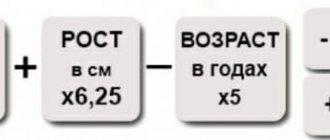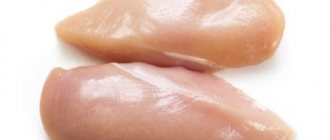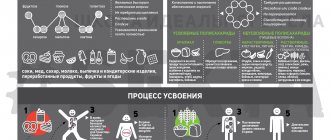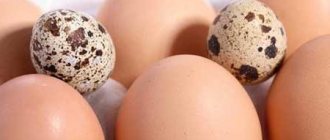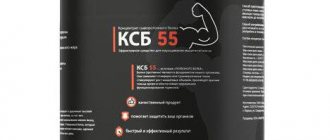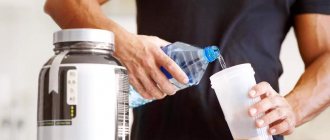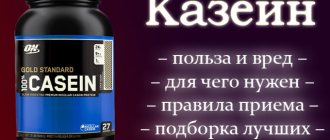- October 6, 2018
- Sports nutrition
- Natalie M
Any person who follows a diet has at least once wondered how much protein is needed per 1 kg of weight per day for effective weight loss. To quickly get rid of excess weight, you need to know how the body's daily need for protein is calculated. The answer to the question: “How much protein do you need per 1 kg of weight?” It can be difficult, since there are many health food products in stores containing this element.
Many people think that consuming large amounts of protein is healthy. However, this statement is not always true. In this article we will analyze how many grams of protein per kg of weight a person needs, depending on his goals.
Amount of Protein for Weight Loss
Before you start consuming protein supplements, as well as various high-protein snack bars, you should know your own recommended protein intake. But how much protein per kg of weight does a person need to lose weight?
Any nutritional guide will tell you that a healthy adult should consume 10-35% of calories per day from protein. But is it really true that the more protein a person eats per day, the better for the body? Eating any nutrients in large quantities will not bring any benefit to the body, especially if a person wants to lose extra pounds.
Some scientists claim that consuming large quantities of protein foods during a diet significantly reduces weight. However, there is another opinion. Experts who adhere to it believe that the amount of protein consumed should be maintained only at the recommended dose. Let's look at the example of research by scientists.
The most common mistakes when taking protein drinks
If you know how to drink protein correctly, but still aren't seeing significant results, it may be because:
- chose the wrong training program;
- chose cheap nutraceuticals;
- do not take medications on rest days;
- use the products periodically, in courses;
- replace full meals with sports nutrition (remember: since you cannot eat as many nutrients as necessary for rapid muscle growth, nutritional supplements have been invented that complement the basic diet);
- when calculating the dose, do not take into account the percentage of carbohydrates and fats contained in the product (for example, if a dietary supplement contains 90% protein, then in one cap there will be not 30, but 27 g of pure protein);
- you are the “owner” of a too fast or too slow metabolism.
Research
A recent study found that people who consumed 25-30% of their calories from lean, healthy protein were able to lose more fat and also significantly increased the amount of calories they burned.
During the first study, which was devoted to excess weight and obesity in women, experts assessed the condition of those women who consumed so-called high proteins (30%). And those who adhered to a dairy diet, consuming low proteins (15%).
The group of women on a high-protein diet gained lean muscle mass and lost weight faster than the group on a lower-protein diet. The second group also lost extra pounds, but the women also lost muscle mass.
Scientists have suggested that this muscle loss may have a negative impact on a person’s future condition, causing the development of a “plateau effect” during weight loss. Many people who stick to a diet suffer from such an unreasonable cessation of weight loss. Lean muscle mass burns many more calories than fat tissue, even when the human body is at rest.
When those women who ate little protein began to rapidly lose muscle mass, they also lost the ability to burn more calories during the day. On the other hand, the improved tissue composition in the human body of those people who took in large amounts of protein helped them burn more calories in a very short period of time.
It must be remembered that if you consume more calories during the day, no matter what they are, your weight will rapidly increase. But some scientific studies have proven that gaining weight by eating healthy proteins is considered much better than using carbohydrates and fats. But if the main goal is to get rid of extra pounds, then you need to consume calories in a certain amount. This is the path to success.
Now you should familiarize yourself in more detail with how many grams of protein per kilogram of weight are needed by those people who engage in physical exercise.
Why do we need protein?
Every day, throughout our lives, our muscles are constantly changing as they are partially broken down (muscle protein breakdown) and partially repaired (muscle protein synthesis).
There are two common ways to increase muscle protein synthesis: performing weightlifting exercises (or other resistance exercises) and consuming protein.1 When you are trying to lose weight and maintain a calorie deficit, it is important to include enough protein in your diet to prevent muscle protein breakdown.2
Protein also slows down digestion, making us feel fuller longer, which promotes weight loss. This property can make life easier for all snack lovers, because most likely, if your digestion is slow, you will stay away from the refrigerator...
As we age, we tend to lose muscle mass, so consuming enough protein is important for older adults as well.3
Amount of protein for athletes
If exercise is included in a program to burn excess weight, protein simply needs to be included in your diet. It should be noted that the need for it among athletes is much higher than among those who simply follow a diet. Those athletes who follow a diet in addition to exercise should adhere to the protein intake recommendations of 10-35%, while continuing to consume maximum protein. But what will be the amount of protein per 1 kg of weight? There is a fairly simple formula for calculating the amount of protein.
The average dieter should consume 1 gram of protein per 1 kg of weight. People who exercise vigorously should consume approximately 1.5 grams of protein per kilogram of body weight. In this case, we are talking about those people who play sports about 10 hours a week.
From the above, it becomes clear that to lose weight you should consume 1 gram of protein per 1 kg of weight. But is it necessary to use any additional supplements in this case? More on this later.
So how much protein should you eat per day (no, not 2 g per 1 kg of body) - Om Activ
The body needs protein not only to increase muscle mass. It is involved in tissue repair, hormone production, strengthening the immune system and many other processes. We present the formula for calculating protein norms. Protein norm for a healthy adult = weight * coefficient + 50%
The coefficient depends on gender and level of physical activity:
| doesn't train | training | |
| woman | 1 | 1,2 |
| man | 1,2 | 1,6 |
In case of illness, the attending physician will adjust the coefficient.
A woman who weighs 60 kg and exercises should consume 108 grams of protein daily.
60*1,2 = 72 + 50% = 72 + 36 = 108.
What's 50%?
The body does not absorb all the protein entering it for three reasons: the properties of the product, heat treatment of the product, and the health of the digestive system.
Each product has its own coefficient. It takes into account the amount of amino acids and the percentage of their absorption. The closer the coefficient is to one, the more amino acids there are in the product and the better they are absorbed.
| Product (100 g) | Proteins (g) | absorption coefficient |
| eggs | 12,7 | 1,0 |
| cottage cheese | 16,7 | 1,0 |
| beef | 18,9 | 0,92 |
| chicken | 20,8 | 0,92 |
| buckwheat | 12,6 | 0,66 |
| beans | 22,3 | 0,68 |
| soybeans | 34,9 | 0,91 |
For example, beans are only 60% digestible. Out of 20 g of protein from 100 grams of beans, the body will absorb only 12. And this is with the ideal functioning of the digestive system.
Some proteins are destroyed during heat treatment, while others are not absorbed due to problems in the digestive system. If you count how much protein you consume from each dish, you will go crazy. That is why nutritionists round up inevitable losses to 50%.
It's not enough to eat enough protein. You still need to learn it. They wrote a big article about this.
Let us remind you that protein should be eaten with fiber – greens and vegetables.
Protein also needs to be distributed among meals, taking into account digestive capabilities:
- breakfast — 20%
- snack — 5-7%
- dinner — 40%
- snack — 5-7%
- dinner — 20%
- snack — 5-7%
When you weigh a lot or lead a very active lifestyle, you need large amounts of protein. If the digestive system finds it difficult to cope with it, add an amino acid complex or a protein shake to your diet, replacing some of the protein products with it.
Worried that too much protein will harm you? This is only possible for certain diseases. They are diagnosed by a doctor.
And there is no direct analysis that will tell you that you are going too far with protein. Yes, you can take a biochemical blood and urine test for protein. But protein can be increased even with insufficient consumption, when it is poorly absorbed. The doctor finds and eliminates the cause.
What to do if you want to get enough protein:
- Calculate your protein intake.
- Consume protein regularly.
- Increase protein absorption.
The body needs protein not only to increase muscle mass. You can't go anywhere without him.
(3755)
comments powered by HyperComments
Use of other supplements
Most protein supplements are quite expensive, and some contain sugar and other unwanted substances. But why waste your money while consuming extra calories? Experienced trainers say that when getting rid of excess weight, it is best to avoid any protein supplements.
If the diet contains healthy food that contains proteins, this will be quite enough to satisfy the needs of the human body. In this case, 1 gram of protein per 1 kg of weight is also consumed. However, to do this you need to know which foods and in what quantity contain protein. Not everyone knows that products present on almost every table can provide a person with the necessary amount of proteins.
As mentioned earlier, 1 gram of protein per 1 kg of weight will be quite enough for those people who exercise and adhere to a diet. We suggest that you familiarize yourself in more detail with the amount of protein contained in certain foods.
Advantages and disadvantages
The positive aspects of protein consumption are obvious. This substance accelerates the process of muscle growth and helps replenish the necessary elements in the body. Since the powder is made exclusively from natural ingredients, it does not pose any harm to health.
The only thing that novice athletes need to take into account is that protein is an additional source of protein, but not the main one. Under no circumstances should you replace all meals with a cocktail containing this supplement. Also, when calculating the daily intake of a substance, it is important to take into account and subtract the amount of protein that a person receives from food.
The disadvantages of the powder include its cost. It’s not without reason that people are so interested in how long 1 kg of protein will last. For protein concentrate you will have to pay an average of about 3 thousand rubles, 1000-1500 rubles. casein and soy protein will cost.
Protein sources
The main sources of protein are: poultry and cattle meat, eggs, fish, cottage cheese and cheese. These proteins are usually called animals. Beans, peas, and nuts also contain proteins, but they are vegetable. Plant proteins are necessary for humans to grow and build all organs and tissues in the body. The least amount of protein is found in fruits and berries.
It should be noted that those products that are of animal origin contain, on average, more proteins than others. In addition, they have a properly balanced amino acid composition, which is very important for proper digestion, as well as for the body’s absorption of protein components. However, it is best not to overuse protein foods. During overeating, putrefactive processes in the intestines begin to intensify, which provokes the formation and absorption of toxic decay elements directly into the blood.
But I'm more prepared than these guys!
Another opinion that is often heard is that people need more protein because they are more experienced than the study population. Well, Tarnopolskyetal (1988) used experienced bodybuilders and found that they needed less protein than beginners.
In fact, several studies have suggested that the more experienced you are, the less protein you need (Rennie & Tipton, 2000; Hartman, Moore & Phillips, 2006; Moore et al., 2007).
Every person constantly undergoes protein synthesis and breakdown. Weight training leads to an increase in breakdown and synthesis, normally the balance shifts towards synthesis. As your training progresses, your body becomes more effective at inhibiting protein breakdown due to training. Therefore, less and less protein is required for recovery, this increases nitrogen retention, which means less protein is subsequently needed for optimal growth.
In addition, the more you train, the less protein synthesis increases after exercise. As you become more muscular and closer to your genetic limit, less muscle is built after exercise. It's intuitive. The less muscle you can build, the less protein you need for optimal growth. It wouldn't make any sense if the body needed more protein to build less muscle, especially since the body metabolizes protein more efficiently.
Nutritional Features
We have figured out that it is not at all necessary to use store-bought protein to make up for the lack of proteins in your body. These elements can be obtained from foods that are rich in proteins. For 1 kg of weight, 1 g of protein will be enough for those people who want to lose weight by following a diet.
For example, how much protein is in a chicken egg? There is a total of 5 g of protein in an egg. It is worth noting that the protein alone contains 4 g of protein. If you mix one chicken egg with several egg whites, you can make a delicious dietary snack. The body in this case will receive 15 g of protein or more, without any additional fat.
For lunch you can eat a lean piece of chicken. As for the amount of protein in chicken, a breast weighing about 115 g typically contains 26 g of protein.
Sources[edit | edit code]
- Lambert CP, Frank LL, Evans WJ: Macronutrient considerations for the sport of bodybuilding. Sports Med 2004, 34:317-327. https://www.ncbi.nlm.nih.gov/pubmed/15107010?dopt=Abstract&holding=f1000,f1000m,isrctn
- Butterfield GE: Whole-body protein utilization in humans. Med Sci Sports Exerc 1987, 19:S157-S165. https://www.ncbi.nlm.nih.gov/pubmed/3316915?dopt=Abstract&holding=f1000,f1000m,isrctn
- Lemon PW: Beyond the zone: protein needs of active individuals. J Am Coll Nutr 2000, 19:513S-521S. https://www.ncbi.nlm.nih.gov/pubmed/11023001?dopt=Abstract&holding=f1000,f1000m,isrctn
- Phillips SM: Dietary protein for athletes: from requirements to metabolic advantage. Appl Physiol Nutr Metab 2006, 31:647-654. https://www.ncbi.nlm.nih.gov/pubmed/17213878?dopt=Abstract&holding=f1000,f1000m,isrctn
- Phillips SM, Moore DR, Tang JE: A critical examination of dietary protein requirements, benefits, and excesses in athletes. Int J Sport Nutr Exerc Metab 2007, 17(Suppl):S58-S76.https://www.ncbi.nlm.nih.gov/pubmed/18577776?dopt=Abstract&holding=f1000,f1000m,isrctn
- Slater G, Phillips SM: Nutrition guidelines for strength sports: sprinting, weightlifting, throwing events, and bodybuilding. J Sports Sci 2011, 29:S67-S77.https://www.ncbi.nlm.nih.gov/pubmed/21660839?dopt=Abstract&holding=f1000,f1000m,isrctn
- Tipton KD, Wolfe RR: Protein and amino acids for athletes. J Sports Sci 2004, 22:65-79. https://www.ncbi.nlm.nih.gov/pubmed/14971434?dopt=Abstract&holding=f1000,f1000m,isrctn
- Phillips SM, Van Loon LJ: Dietary protein for athletes: from requirements to optimal adaptation. J Sports Sci 2011, 29(Suppl 1):S29-S38.https://www.ncbi.nlm.nih.gov/pubmed/22150425?dopt=Abstract&holding=f1000,f1000m,isrctn
- Garthe I, Raastad T, Refsnes PE, Koivisto A, Sundgot-Borgen J: Effect of two different weight-loss rates on body composition and strength and power-related performance in elite athletes. Int J Sport Nutr Exerc Metab 2011, 21:97-104. https://www.ncbi.nlm.nih.gov/pubmed/21558571?dopt=Abstract&holding=f1000,f1000m,isrctn
- Mero AA, Huovinen H, Matintupa O, Hulmi JJ, Puurtinen R, Hohtari H, Karila T: Moderate energy restriction with high protein diet results in healthier outcome in women. J Int Soc Sports Nutr 2010, 7:4.Mero AA, Huovinen H, Matintupa O, Hulmi JJ, Puurtinen R, Hohtari H, Karila T: Moderate energy restriction with high protein diet results in healthier outcome in women. J Int Soc Sports Nutr 2010, 7:4.
- Mettler S, Mitchell N, Tipton KD: Increased protein intake reduces lean body mass loss during weight loss in athletes. Med Sci Sports Exerc 2010, 42:326-337. https://www.ncbi.nlm.nih.gov/pubmed/19927027?dopt=Abstract&holding=f1000,f1000m,isrctn
- Millward DJ: Macronutrient intakes as determinants of dietary protein and amino acid adequacy. J Nutr 2004, 134:1588S-1596S. https://www.ncbi.nlm.nih.gov/pubmed/15173435?dopt=Abstract&holding=f1000,f1000m,isrctn
- Stiegler P, Cunliffe A: The role of diet and exercise for the maintenance of fat-free mass and resting metabolic rate during weight loss. Sports Med 2006, 36:239-262. https://www.ncbi.nlm.nih.gov/pubmed/16526835?dopt=Abstract&holding=f1000,f1000m,isrctn
- Walberg JL, Leidy MK, Sturgill DJ, Hinkle DE, Ritchey SJ, Sebolt DR: Macronutrient content of a hypoenergy diet affects nitrogen retention and muscle function in weight lifters. Int J Sports Med 1988, 9:261-266. https://www.ncbi.nlm.nih.gov/pubmed/3182156?dopt=Abstract&holding=f1000,f1000m,isrctn
- Helms ER, Zinn C, Rowlands DS, Brown SR: A systematic review of dietary protein during caloric restriction in resistance trained lean athletes: a case for higher intakes. Int J Sport Nutr Exerc Metab 2013. Epub ahead of print
- Lemon PW: Beyond the zone: protein needs of active individuals. J Am Coll Nutr 2000, 19:513S-521S. https://www.ncbi.nlm.nih.gov/pubmed/11023001?dopt=Abstract&holding=f1000,f1000m,isrctn
- Phillips SM: Dietary protein for athletes: from requirements to metabolic advantage. Appl Physiol Nutr Metab 2006, 31:647-654. https://www.ncbi.nlm.nih.gov/pubmed/17213878?dopt=Abstract&holding=f1000,f1000m,isrctn
- Phillips SM, Moore DR, Tang JE: A critical examination of dietary protein requirements, benefits, and excesses in athletes. Int J Sport Nutr Exerc Metab 2007, 17(Suppl):S58-S76.https://www.ncbi.nlm.nih.gov/pubmed/18577776?dopt=Abstract&holding=f1000,f1000m,isrctn
- Slater G, Phillips SM: Nutrition guidelines for strength sports: sprinting, weightlifting, throwing events, and bodybuilding. J Sports Sci 2011, 29:S67-S77.https://www.ncbi.nlm.nih.gov/pubmed/21660839?dopt=Abstract&holding=f1000,f1000m,isrctn
- Tipton KD, Wolfe RR: Protein and amino acids for athletes. J Sports Sci 2004, 22:65-79. https://www.ncbi.nlm.nih.gov/pubmed/14971434?dopt=Abstract&holding=f1000,f1000m,isrctn
- Phillips SM: Protein requirements and supplementation in strength sports. Nutrition 2004, 20:689-695. https://www.ncbi.nlm.nih.gov/pubmed/15212752?dopt=Abstract&holding=f1000,f1000m,isrctn
- Tarnopolsky MA: Building muscle: nutrition to maximize bulk and strength adaptations to resistance exercise training. Eur J Sport Sci 2008, 8:67-76. https://www.tandfonline.com/doi/abs/10.1080/17461390801919128#.VFQadvmsWsw
- Tipton KD: Protein for adaptations to exercise training. Eur J Sport Sci 2008, 8:107-118. https://www.tandfonline.com/doi/abs/10.1080/17461390801919102#.VFQagvmsWsw
- Kleiner SM, Bazarre TL, Litchford MD: Metabolic profiles, diet, and health practices of championship male and female bodybuilders. J Am Diet Assoc 1990, 90:962-967. Kleiner SM, Bazzarre TL, Litchford MD: Metabolic profiles, diet, and health practices of championship male and female bodybuilders. J Am Diet Assoc 1990, 90:962-967.
- Sandoval WM, Heyward VH: Food selection patterns of bodybuilders. Int J Sport Nutr 1991, 1:61-68. https://www.ncbi.nlm.nih.gov/pubmed/1844403?dopt=Abstract&holding=f1000,f1000m,isrctn
- Bamman MM, Hunter GR, Newton LE, Roney RK, Khaled MA: Changes in body composition, diet, and strength of bodybuilders during the 12 weeks prior to competition. J Sports Med Phys Fitness 1993, 33:383-391. https://www.ncbi.nlm.nih.gov/pubmed/8035587?dopt=Abstract&holding=f1000,f1000m,isrctn
- Lambert CP, Frank LL, Evans WJ: Macronutrient considerations for the sport of bodybuilding. Sports Med 2004, 34:317-327. https://www.ncbi.nlm.nih.gov/pubmed/15107010?dopt=Abstract&holding=f1000,f1000m,isrctn
- Maestu J, Eliakim A, Jurimae J, Valter I, Jurimae T: Anabolic and catabolic hormones and energy balance of the male bodybuilders during the preparation for the competition. J Strength Cond Res 2010, 24:1074-1081. https://www.ncbi.nlm.nih.gov/pubmed/20300017?dopt=Abstract&holding=f1000,f1000m,isrctn
- Sandoval WM, Heyward VH, Lyons TM: Comparison of body composition, exercise and nutritional profiles of female and male body builders at competition. J Sports Med Phys Fitness 1989, 29:63-70. https://www.ncbi.nlm.nih.gov/pubmed/2770270?dopt=Abstract&holding=f1000,f1000m,isrctn
- Walberg-Rankin J, Edmonds CE, Gwazdauskas FC: Diet and weight changes of female bodybuilders before and after competition. Int J Sport Nutr 1993, 3:87-102. https://www.ncbi.nlm.nih.gov/pubmed/8499941?dopt=Abstract&holding=f1000,f1000m,isrctn
- Withers RT, Noell CJ, Whittingham NO, Chatterton BE, Schultz CG, Keeves JP: Body composition changes in elite male bodybuilders during preparation for competition. Aust J Sci Med Sport 1997, 29:11-16. https://www.ncbi.nlm.nih.gov/pubmed/9127683?dopt=Abstract&holding=f1000,f1000m,isrctn
- van der Ploeg GE, Brooks AG, Withers RT, Dollman J, Leaney F, Chatterton BE: Body composition changes in female bodybuilders during preparation for competition. Eur J Clin Nutr 2001, 55:268-277. https://www.ncbi.nlm.nih.gov/pubmed/11360131?dopt=Abstract&holding=f1000,f1000m,isrctn
- Newton LE, Hunter GR, Bammon M, Roney RK: Changes in psychological state and self-reported diet during various phases of training in competitive bodybuilders. J Strength Cond Res 1993, 7:153-158. OpenURL
- Helms ER, Zinn C, Rowlands DS, Brown SR: A systematic review of dietary protein during caloric restriction in resistance trained lean athletes: a case for higher intakes. Int J Sport Nutr Exerc Metab 2013. Epub ahead of print
- Celejowa I, Homa M: Food intake, nitrogen and energy balance in Polish weight lifters, during a training camp. Nutr Metab 1970, 12:259-274. https://www.ncbi.nlm.nih.gov/pubmed/5510411?dopt=Abstract&holding=f1000,f1000m,isrctn
- Hall KD: What is the required energy deficit per unit weight loss? Int J Obes 2007, 32:573-576. OpenURL
- Elia M, Stubbs RJ, Henry CJ: Differences in fat, carbohydrate, and protein metabolism between lean and obese subjects undergoing total starvation. Obes Res 1999, 7:597-604. https://www.ncbi.nlm.nih.gov/pubmed/10574520?dopt=Abstract&holding=f1000,f1000m,isrctn
- https://www.ncbi.nlm.nih.gov/pubmed/5510411?dopt=Abstract&holding=f1000,f1000m,isrctnhttps://www.ncbi.nlm.nih.gov/pubmed/3182156?dopt=Abstract&holding=f1000, f1000m,isrctn
- Mettler S, Mitchell N, Tipton KD: Increased protein intake reduces lean body mass loss during weight loss in athletes. Med Sci Sports Exerc 2010, 42:326-337. https://www.ncbi.nlm.nih.gov/pubmed/19927027?dopt=Abstract&holding=f1000,f1000m,isrctn
- Helms ER, Zinn C, Rowlands DS, Brown SR: A systematic review of dietary protein during caloric restriction in resistance trained lean athletes: a case for higher intakes. Int J Sport Nutr Exerc Metab 2013. Epub ahead of print
- Pasiakos SM, Cao JJ, Margolis LM, Sauter ER, Whigham LD, McClung JP, Rood JC, Carbone JW, Combs GF Jr, Young AJ: Effects of high-protein diets on fat-free mass and muscle protein synthesis following weight loss: a randomized controlled trial. FASEB J 2013, 27:3837-3847. https://www.ncbi.nlm.nih.gov/pubmed/23739654?dopt=Abstract&holding=f1000,f1000m,isrctn
Amount of protein for muscle growth
People trying to gain weight should consume a certain amount of protein per day. Protein is the main building material of muscle tissue. If the amount of protein entering the body is insufficient, then the muscles will not only stop growing, but will also be destroyed. But if the daily protein intake is exceeded, disturbances in the functioning of the liver and kidneys may occur. This is why it is so important to correctly calculate the amount of protein consumed. To gain muscle mass, you need to consume 1.5 to 2.2 g of protein per day per kilogram of body weight.
How much protein do I need?
Protein is one of three macronutrients we need daily for energy and well-being.
But exactly how much protein do we need, and how much is too much? This article discusses how to optimize your protein intake to meet your body's needs and support your training goals. There are many reasons why you might take protein shakes—building muscle, losing weight, gaining weight, recovering from an injury or illness. Protein shakes can be helpful in each of these cases, depending on what you put in them and how often you take them.
Before you measure out your powder and start making your shake, figure out how many protein shakes you should be taking per day. You need to think about your muscle growth and recovery goals and how they fit into your daily schedule.
Are there limits?
Are there any restrictions regarding the amount of protein consumed? Experts strongly do not recommend consuming more than 3 g of protein per kilogram of body weight per day. The fact is that an excess of this element can lead to problems with the kidneys and liver. Therefore, protein consumption per day in the amount of 3.3 g can be justified only by the conditions of severe drying, which professional athletes resort to.
